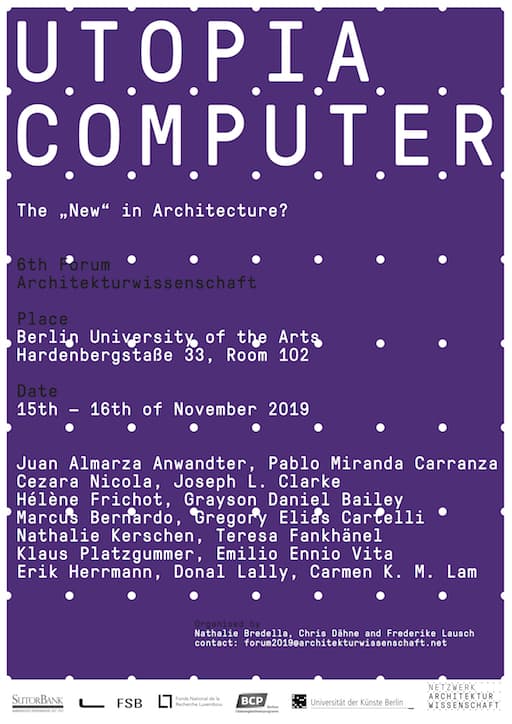15.11. – 16.11.2019
• Berlin University of the Arts,
Hardenbergstraße 33, Room 102
Kolloquium
Utopia Computer: The “New” in Architecture? 6th Forum Architekturwissenschaft
Organised by
Nathalie Bredella, Chris Dähne and Frederike Lausch
Contact: forum2019@architekturwissenschaft.net
The critical concern of the workshop “Utopia Computer” is the euphoria, expectation and hope inspired by the introduction of computers within architecture in the early digital age. With the advent of the personal computer and the launch of the Internet in the 1990s, utopian ideals found in architectural discourse from the 1960s were revisited and adjusted to the specific characteristics of digital media.
Buckminster Fuller’s World Game, Gordon Pask’s belief in an architecture that can learn via feedback loops, and Frei Otto’s form-finding experiments bore witness to concepts of participatory planning procedures and self-optimising design processes. These ideas gathered momentum in the 1990s: virtual spaces were explored as potential sites for generating collective and interactive urban solutions, and algorithm-based computer software fostered the notion of a self-organising architecture. At the same time, technological developments that influenced architectural practice at the turn of the millennium were part of neoliberal shifts in politics and the economy. Scenarios of all-encompassing surveillance and the commercial use of private data, as well as social injustices resulting from free-market economic practices, thus beg the question, have dystopian narratives replaced utopian ones? Taking the 1990s discourse as a starting point, the workshop seeks to explore in what ways utopian ideas from the 1960s have impacted today’s digital culture by addressing the following topics:
– Subjects and Societies – explores the effects of digital technology on social actors who interact with architecture.
– Organism and Organisation – focuses on the assumed and actual changes in design due to digitalisation, especially with regard to natural growth processes.
– Data and Form – looks at how digital tools transform architectural design by processing large amounts of data.
Program
Friday – November 15, 2019
2:00 pm – Introduction – Welcome –
Session I: Subjects and Societies
2:30 pm
About the Role of Digital Technologies in the Modelling of Contemporary Architectural Experience
– Juan Almarza Anwandter, TU Berlin
3.00 pm
Diagrams of Rationality: Christopher Alexander and the Automation of Design
– Pablo Miranda Carranza, KTH Stockholm
3:30 pm – Coffee Break –
4:00 pm
Virtual Artistic Spaces: Roy Ascott’s LPDT2, Cybernetics and Beyond
– Cezara Nicola, University of Bucharest
4:30 pm
The Art of Work: From Bürolandschaft to Computational Design
– Joseph L. Clarke, University of Toronto
5:00 pm – Panel Discussion –
5:30 pm – Break –
7:00 pm
Dirty Theory for a New Materialism: From Gilles Deleuze to Jennifer Bloomer
– Hélène Frichot, KTH Stockholm
Saturday – November 16, 2019
Session II: Organism and Organization
9:30 am
Prerequisites for Self-Organization: the Reemergence of Colin Ward
– Grayson Daniel Bailey, University at Buffalo / Bauhaus University Weimar
10:00 am
Unmanageable Utopias: Analogic Cybernetics Aided Self-Organized-Settlements
– Marcus Bernardo, University Belo Horizonte
10:30 am – Coffee Break –
11:00 am
Manipulating Fabrics: The Language Between Organism and Organization, 1956–1962
– Gregory Elias Cartelli, Princeton University
11:30 am
Towards a New Understanding of the Animal
– Nathalie Kerschen, McGill University Montreal
12:00 am – Panel Discussion –
12:30 am – Lunch Break –
Session III: Data and Form
1:30 pm
The Architecture Machine. The Role of Computers in Architecture
– Teresa Fankhänel, TU München
2:00 pm
Code and Notation: Considerations on the Mediality of Architectural Drawings
– Klaus Platzgummer, TU Berlin
2:30 pm
Cognitive Prosthesis, Time, Fractals
– Emilio Ennio Vita, Politecnico di Milano University
3:00 pm – First Panel Discussion –
3:30 pm – Coffee Break –
4:00 pm
Houses of Ice. From Raster Utopias to the Discrete Movement
– Erik Herrmann, Ohio State University
4:30 pm
Vestal Fire: Artificial Intelligence, Data Centres and Dirty Matter
– Donal Lally, TU Dublin
5:00 pm
Models, Statistics, Inscriptions – Tracing the Transformation of Architectural Positions in the Ekistics
– Carmen K.M. Lam, Bauhaus University Weimar
5:30 pm – Second Panel Discussion –
6:00 pm Closing Remarks
